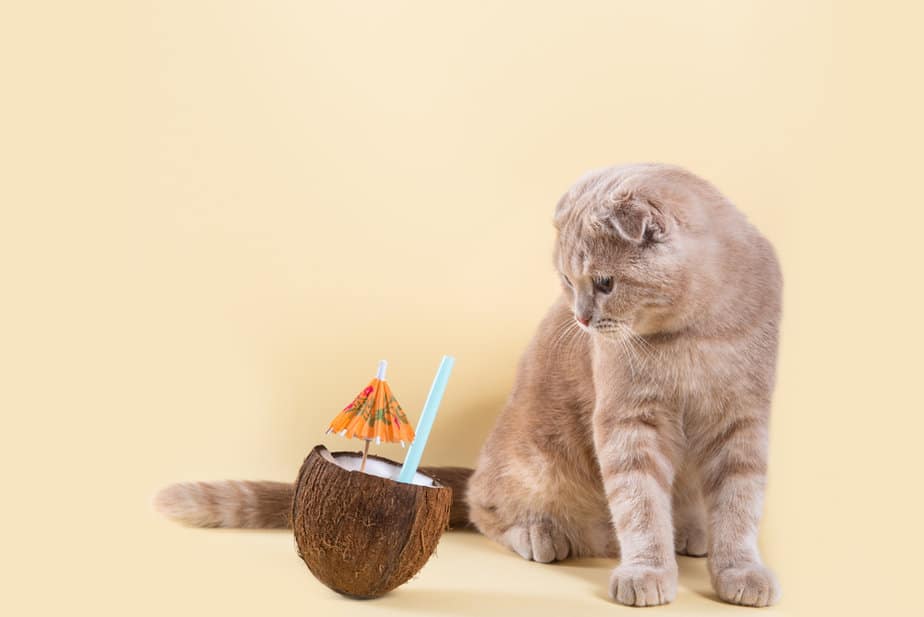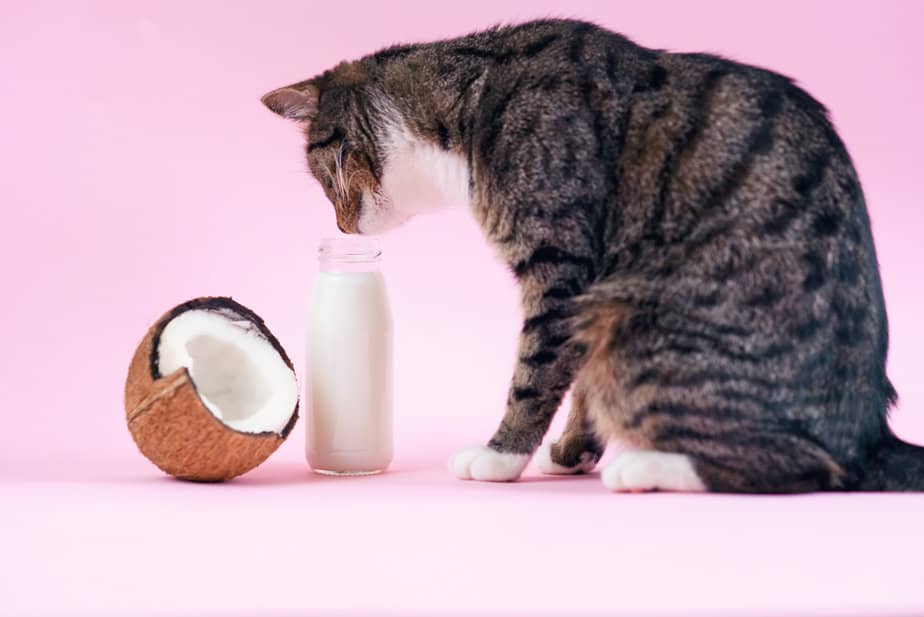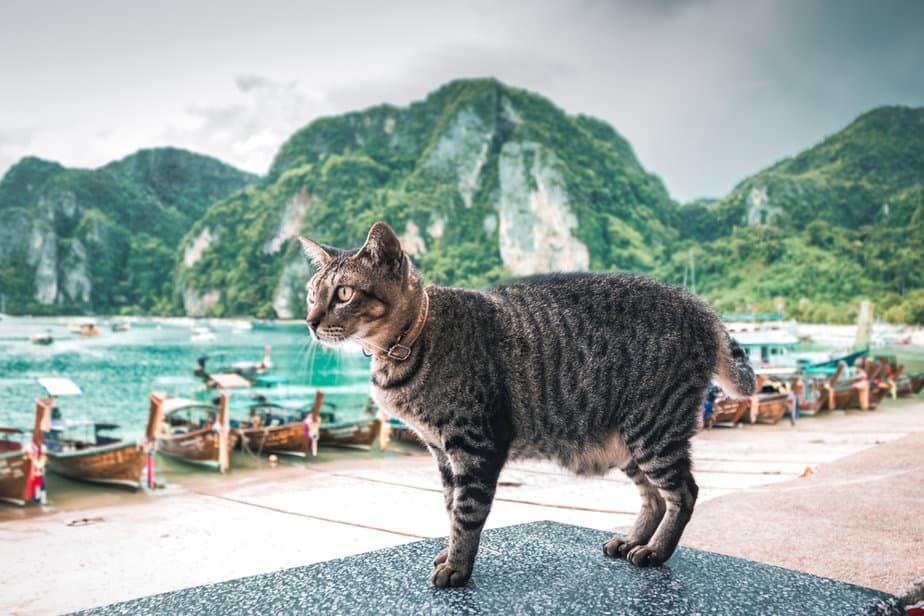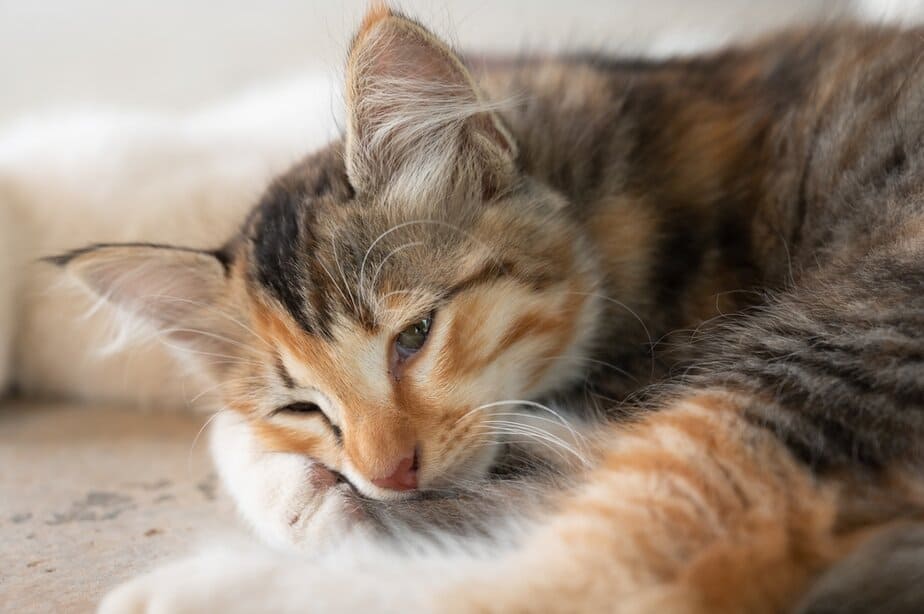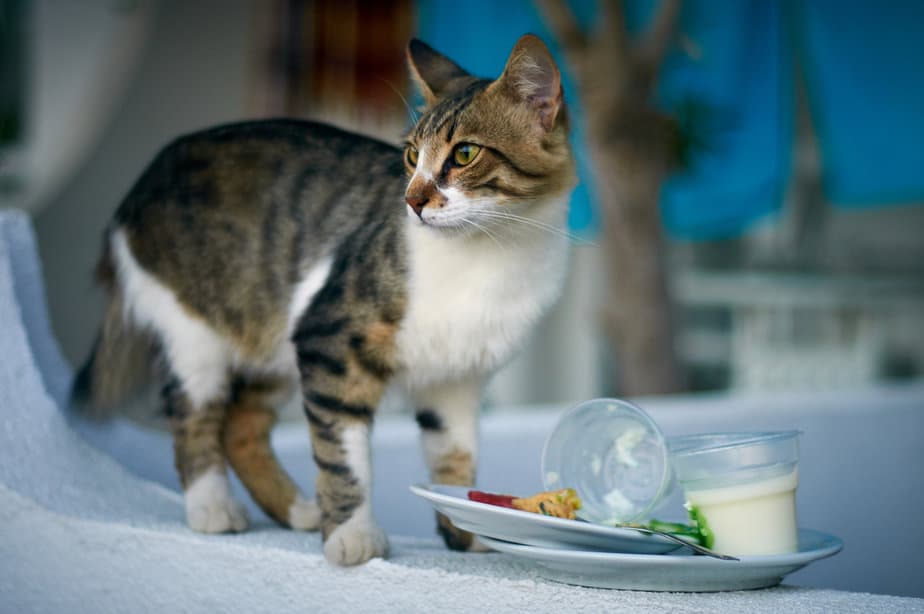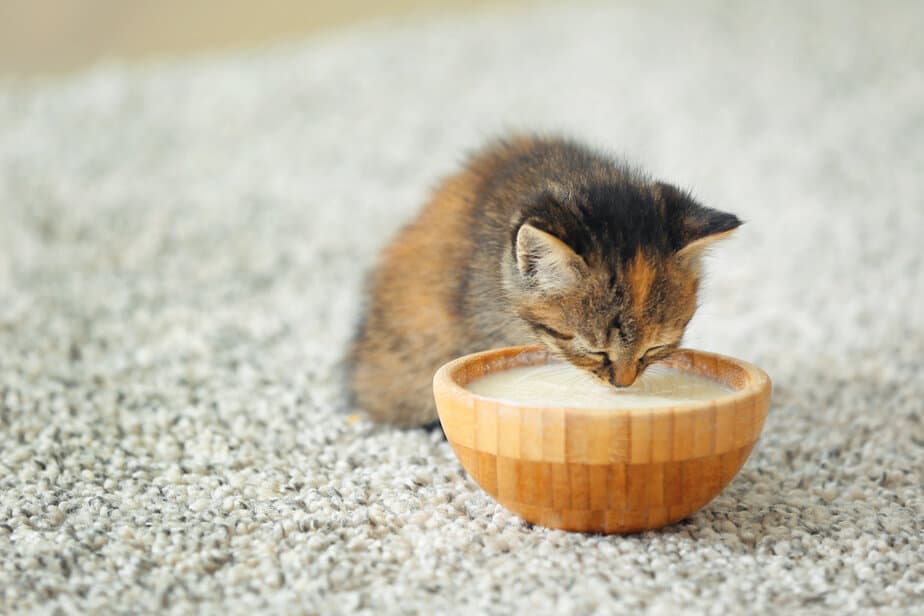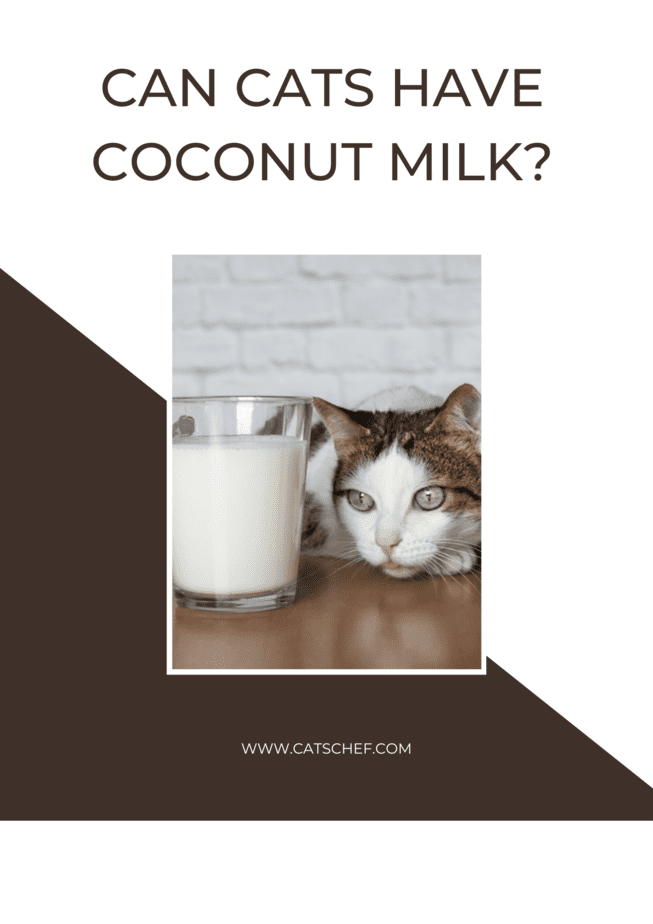📖 Table of Content:
“Hmm, can cats have coconut milk?” You’re sitting on a beach staring into the turquoise water and sipping on your coconut cocktail… You’re having the time of your island life as the sun’s shining on your face and tickling your feet… “Wait, what?! Who’s tickling my feet?”
And just like that, you wake up out of your dream with your furry friend demanding a lick of your not-so-tropical treat. “No, but seriously, can cats have coconut milk?” You can’t help but giggle at the fact you’ve been awakened from your tropical dream because she’s gotten hangry in the meantime.
Now you’re faced with a pretty serious dilemma. You can’t give her a lick without consulting with your vet. Have you forgotten about the time when she scoffed down the entire mug of warm milk you’ve been meaning to have with your Oreos?
“Argh, that diarrhea was NASTY, and we’re not doing that again!” Sure, nobody’s milking coconuts. But, you’re not taking your chances simply because coconut milk isn’t REAL milk. You’re not taking your chances simply because your mischievous monster’s threatening you with scratches and bites.
Time to get down to business – can your cat suffer through another diarrhea episode on the off chance that you give her a little bit of coconut milk? Our friends over at the ASPCA (American Society for the Prevention of Cruelty to Animals) seem to think that way.
Coconuts aren’t the worst things your cat can munch on, but they don’t recommend letting her drink coconut milk. “Why?! How?!” Bear with me and read everything you need to know to keep your four-legged friend safe (and away from this tasty, but oh-so-risky treat).
What’s the deal with cats and coconuts?
Coconut, the queen (or the king) of tropical desserts and drinks, happens to be a fruit, a seed, and a nut. Coconuts grow on tropical trees (duh!). And when you open them, you get to the coconut water and coconut meat. How many times can we say coconut before you click out of the article?!
So, where the heck does coconut milk come from? Humans don’t milk coconuts (to everyone’s demise). But, they do make coconut milk out of matured coconut flesh and some water. They use the same technique to make other types of milk that don’t come from an animal (they only milk the moos and the maas of the world).
Cats and coconuts don’t have much in common, but that’s not to say that they can’t enjoy each other’s company. Coconuts aren’t poisonous to our furry friends (can we get a “yaaay!”) and munching on some coconut flesh here and there won’t send your furry baby to the emergency animal center.
But, coconuts aren’t necessarily a natural part of your cat’s diet. Actually, cats are carnivores. They require a bunch of meat, animal protein, and animal nutrients in their diets to survive and thrive. They don’t need fruits, veggies, and nuts the same way you do.
And, they don’t even possess the enzymes necessary for their digestive systems to break down and process most foods you eat regularly. You don’t see wild cats chasing after coconuts when they’re looking for an afternoon snack, do you?
What makes you think your not-so-wild cat would rather nibble on coconut flesh than on a paw-licking, mouth-watering T-bone steak? But, she might be set on her intentions to devour everything your lips have ever touched, even when we’re talking about a mere coconut morsel. So, can cats eat coconut milk?
Can cats have coconut milk?
“Argh, I remember what happened last time she sipped some milk! She’s not doing that EVER. AGAIN. At least not under my watch!”
Here’s the thing – it’s pretty weird that cats can’t drink regular moo milk. We’ve seen both Tom AND Jerry drinking milk straight out of the bow and we’re pretty sure they weren’t drinking almond milk or oat milk. We’ve been fooled into thinking cats can drink milk?
Actually, that’s not far from the truth because most cats are lactose intolerant. When they’re kittens, they feed off of their mother’s milk. When they’re grown up, they no longer need the milk. Therefore, their digestive systems lose the enzymes necessary to break down the lactose that’s typically found in milk.
On the other hand, coconut milk doesn’t contain lactose which would mean it’s pretty safe for feline consumption. Your feline could have a lick or two when she’s being fussy about her regular cat food. But… There’s always a but somewhere in there.
Coconut milk contains coconut (which is pretty safe) and sugar (which isn’t). Feeding coconut milk to your feline shouldn’t become a regular thing and here’s everything you need to know to make up your mind (before you order a batch of coconuts from Florida).
1. Coconut
Humans like you and me adore putting coconut into everything – drinks, desserts, and sweet and savory meals (coconut curry screams “YUM!”). And, what’s even more important, we love putting coconut into everything because it’s packed with nutrients that can benefit our health.
Coconuts are beaming with vitamins, minerals, antioxidants, protein, and healthy fats. We’re talking about vitamin B, manganese, copper, and iron. These can boost our immune system, maintain the health of our nervous system, and ensure the proper function of our digestive system.
Coconuts have every system of ours covered, AND they’re pretty stinkin’ cute (pun absolutely intended) when added to body butter and hydrating masks. But, (and you could probably sense this but coming) coconuts don’t do much for our furry friends.
Actually, our friends over at the ASPCA don’t recommend feeding coconut to your four-legged friend for two reasons. Firstly, coconuts aren’t a natural part of your cat’s diet which means they don’t bring that much to the table in terms of nutritional and health benefits.
Secondly, coconuts can cause digestive problems to your cat when consumed excessively or over a longer period of time. Nausea, vomiting, and diarrhea don’t make not being able to say “No” to your cat that appealing, do they? Coconuts are out ruled and outnumbered, but what about sugar?
2. Sugar
You might have guessed this one yourself, but sugar isn’t the best thing your feline friend can munch on. Don’t get me wrong, sugar isn’t something that’s going to send her running to her litterbox in the middle of the night. But, nibbling on sugar EVERY. SINGLE. DAY could.
Cats can’t even taste sweet things so they aren’t necessarily missing out on anything. Sugar isn’t a natural part of their diet which means their digestive systems aren’t equipped to deal with it. Sugar can be pretty tough on your cat’s stomach and it’s best avoided at all times.
Here comes the catch – coconut milk can but doesn’t have to contain sugar. Commercially available coconut milk contains a bunch of ingredients that make up for the fact that you (or your cat) aren’t drinking real milk. Sugar’s on top of the list of these ingredients with 3,3 grams per serving size.
Homemade coconut milk doesn’t have to contain anything other than coconut flesh and some water. Now, that’s the type of milk your furry friend can get behind (although not every day and not too much). But, when you’re looking to spice things up a bit you can definitely make some homemade coconut milk.
3. Preservatives
And don’t even get me started on preservatives! Cats can have coconut milk, but they absolutely can’t have the preservatives that come with most commercially available coconut milk. Sure, sure, we get it – they put the preservatives in there to make the milk last longer.
But, these preservatives can cause a bunch of digestive problems to your four-legged friend. Nausea, vomiting, and diarrhea are only some of the things you can expect when she decides to go ham on your overpriced carton of milk you JUST got from Trader Joe’s.
Can things get any worse? They sure can, having in mind that SOME preservatives can even be poisonous to cats. Trust me, your cat can have a little bit of hydroxytoluene (BHT) and butylated hydroxyanisole (BHA), but she can’t have any sodium benzoate (E211).
Nope, none of these are taken out of the Harry Potter movies. And nope, none of them belong in Mrs. McFluffer’s bowl. Coconut milk might not seem like something that could cause health problems to your fluffy munching. But, it’s better to be safe than sorry.
What’s to expect when your cat has coconut milk?
You can’t wrap your head around this “can cats have coconut milk” debate and you’re wondering what to expect when your cat has a sip of coconut milk? Worry not; you’re not the only pet parent with these pressing questions. Cats seem to LOVE sipping on milk regardless of your pleas.
You don’t have much to worry about because a little bit of coconut milk shouldn’t send your cat to the emergency animal center. Coconut milk doesn’t contain ingredients that are deemed “poisonous” or “toxic” for the most part.
But, but, but… Your curious creature doesn’t really know when to stop, does she? She’s probably gone overboard on something she shouldn’t have, on more than one occasion. And she’s probably gotten into trouble because she’s eaten too much of something she shouldn’t have.
So, here’s what to expect when your four-legged friend decides to ignore that little voice inside her head that’s telling her “Mrs. McFluffer, please, you’re gonna throw up!”
1. Digestive problems
“Too much of anything can make you sick…”. Boy does that sound like the biggest told-you-so moment when we’re talking about cats and coconut milk. Way too many pet parents think they can feed coconut milk to their cats and kittens because it’s “better than regular milk.”
True, coconut milk doesn’t contain lactose. (Which is typically responsible for sending your feline friend to her litterbox in the middle of the night.) But, coconut milk can’t be the way to prevent this situation from happening because it’s just as likely to cause digestive problems.
Cats don’t have the enzymes necessary to break down and process coconut milk because this tasty treat wasn’t supposed to be a part of their diet. So, their digestive systems have a pretty tough time whenever they take one too many sips.
Stomachache, nausea, vomiting, diarrhea, and even constipation are only some of the repercussions she might be at risk of experiencing. So, hide your coconut products out of the reach of her paws and hope she doesn’t turn on her wild cat instinct to try to find them.
2. Allergies
“Wait, what?! Cats can have coconut milk, but they can be allergic to it?” Listen, cats can have an allergic reaction to pretty much anything they can get their paws on. Cats are pretty similar to humans when it comes to allergies – some are VERY susceptible, and some aren’t.
That’s why it’s super important that you consult with your vet EVERY TIME you’re thinking of introducing something new to her diet. You can never go wrong with giving your vet a quick call and saying something along the lines of “Almonds, yes or no?” or “Coconut milk, kick it or drink it?”
That being said, you should check whether your cat’s allergic to coconut before letting her have a feast. Some of the most common symptoms to keep an eye out for are sneezing, wheezing, drooling, rashes and irritations of the skin, nausea, vomiting, and diarrhea.
Contact your vet the moment that you notice any of these symptoms. And don’t worry, she should be fine as soon as she gets coconut and coconut milk out of her system.
Can cats eat coconut yogurt?
Cats can have coconut milk, but that doesn’t mean they should. Cats can eat coconut yogurt, but that doesn’t mean they should. You’re starting to see a pattern, aren’t you?
Coconut yogurt seems pretty straightforward. You only need to ferment a little bit of coconut milk, add some water, some live cultures, and voilà. Coconut flesh doesn’t pose THAT much danger to your cat, so she should be able to get away with a lick or two.
But, that’s not to say that you should feed coconut yogurt to your cat. This tasty treat might be beaming with vitamins, minerals, and protein. But, it’s off-limits to your cat IN THE LONG RUN. Coconut yogurt doesn’t bring anything to your cat’s table (other than diarrhea and vomiting, of course).
Can cats drink coconut water?
“Hmm, coconut milk’s a MAYBE, coconut yogurt’s a KIND OF, but what about coconut water? Come on, cats can surely drink a little bit of coconut water?!” How do we say this without making your four-legged friend furious? Coconut water’s great, but cats can’t drink too much.
Coconut water contains A LOT of potassium. There’s nothing wrong with potassium and trust me, this isn’t the only time your cat’s eaten something that contains high levels of potassium. But, potassium means you have to be really mindful of the amount of coconut water you let your cat drink.
Consuming TOO MUCH potassium can cause something called hyperkalemia. Hyperkalemia’s just a fancy way of saying your cat’s got a lot of potassium in her system. And it’s about to cause her harm.
Some of the most common symptoms of hyperkalemia are weakness, difficulty moving around and keeping her head up, and pretty severe arrhythmias. When left untreated, hyperkalemia can lead to a dangerous disorder called feline hypokalemic polymyopathy.
So, keep your feline away from that coconut water cocktail!
Can cats have coconut oil?
Ding, ding ding – cats can have coconut oil! They can have a nibble or two every now and then to boost their immune system, battle bone problems such as arthritis and osteoporosis, improve their overall oral health (bye, bye bad breath), and get some help for those pesky passengers (hairball relief coming through).
They can pretty much submerge themselves in coconut oil. It can help with skin rashes, skin irritations, and skin allergies. And don’t even get me started on maintaining the health of her skin and hair! Coconut milk might not be the best choice for your precious purrincess, but coconut oil takes the cake!

